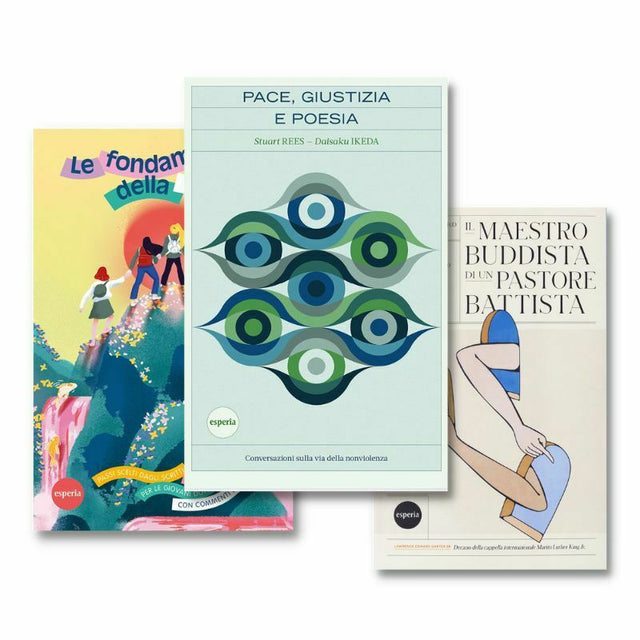
Saggi
-

Esperia Scuola e Lavoro
Ikeda dialoga con i giovani sui temi dello studio e del lavoro.“La gioventù è il campo di battaglia dove sofferenza e speranza si dibattono. Chi vincerà? Deve essere assolutamente la speranza a vincere. Per quanto stiate soffrendo in questo momento, ricordatevi sempre che voi siete nati per vincere. Perchè se non mollate, potete essere sicuri che l’alba sorgerà sicuramente. Non dimenticate mai che possedete l’invincibile spada capace di spezzare qualsiasi sofferenza.” Sono queste le parole con cui l’autore si rivolge ai lettori nell’epilogo di un volume che affronta i temi dello studio e delle scelte professionali. Si tratta di argomenti particolarmente caldi, rispetto ai quali ognuno è chiamato a mettere in campo tutto se stesso. Infatti alla base di ogni risultato, come sottolinea Daisaku Ikeda, vi è sempre una sfida energica, alimentata da una profonda speranza rivolta al futuro.
€6,00
-
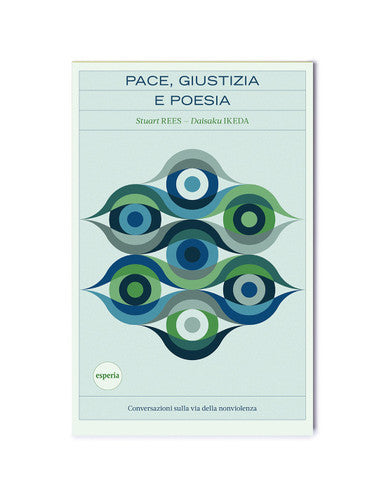
Esperia Pace, giustizia e poesia
La pace non è solo assenza di guerra. Spesso vengono lanciati appelli per gli ideali di “pace e giustizia” ma la maggior parte delle volte finiscono per diventare dei semplici slogan. Nel dialogo contenuto in questo libro, Stuart Rees e Daisaku Ikeda condividono le loro idee e visioni su come creare le condizioni per la pace attraverso una profonda presa di coscienza, un impegno per la nonviolenza in quanto “legge di vita” e una dedizione incrollabile. È convinzione degli autori che siano infatti questi elementi concreti, e non un’ideologia o un pensiero astratto, a rendere possibile una società che coltivi la dignità di tutte le persone. Infine, Rees e Ikeda sottolineano come lo “spirito poetico” sia uno strumento creativo d’eccellenza per immaginare e realizzare un futuro in cui pace e giustizia siano una cosa sola. Pace, giustizia e poesia offre un’analisi affascinante e convincente dei mali che affliggono la nostra società. Indica inoltre un percorso nonviolento che conduce a una pace autentica e offre a chi ricerca la pace l’incoraggiamento e l’ispirazione di cui ha bisogno. Joseph Camilleri, professore emerito di Relazioni Internazionali, La Trobe University, Melbourne
€15,90
-
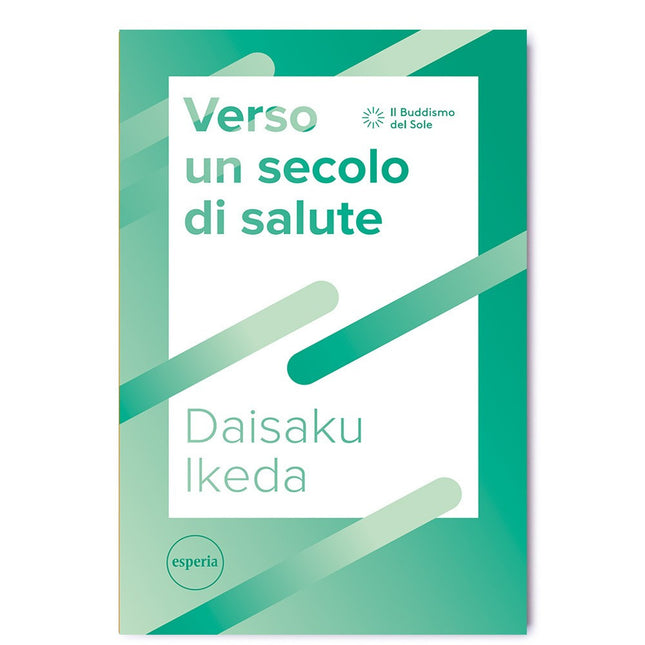
Esperia Verso un secolo di salute
Daisaku Ikeda affronta il tema della salute dal punto di vista del Buddismo condividendo alcuni passi importanti degli scritti di Nichiren. Nelle cinque lezioni presenti in questo volume, tratte dalla serie “Il Buddismo del sole”, il presidente della SGI Daisaku Ikeda affronta il tema della salute, condividendo da diverse prospettive alcuni passi importanti degli scritti di Nichiren Daishonin. L'autore, partendo dal desiderio di ogni persona di essere sana e di poter vivere a lungo, mostra come la luce compassionevole del Buddismo possa illuminare l’oscurità derivante dalle sofferenze di nascita, invecchiamento, malattia e morte e offrire all’umanità la capacità di non guardare alla malattia con avversione ma di considerarla parte integrante della preziosa esperienza dell’essere in vita, un passo indispensabile nel viaggio verso la felicità e il conseguimento della Buddità in questa esistenza. Nella sua lezione Ikeda chiarisce inoltre che la scienza medica e la fede nel Buddismo di Nichiren Daishonin non sono in alcun modo in contraddizione. Poiché abbracciamo il grande insegnamento di Nam myoho renge kyo non vi sono sofferenze karmiche che non possiamo superare. Non è il caso di preoccuparsi o temere la malattia, ciò che conta è il nostro atteggiamento, il modo con cui la affrontiamo. Daisaku Ikeda Quando consideriamo la malattia come una delle sofferenze connaturate alla vita possiamo apprezzare la vera ricchezza dell’esperienza di vivere. Il Buddismo considera la malattia come una parte innata della vita. Quando ci ammaliamo comprendiamo quanto sia importante e prezioso essere sani, e apprezziamo maggiormente la nostra vita e la nostra missione. Inoltre, affrontare la malattia con una forte fede e una preghiera tenace, sviluppando così una vasta condizione vitale, infonde coraggio e speranza alle persone intorno a noi. In questo modo, la malattia diventa la nostra missione. Daisaku Ikeda
€7,90
-
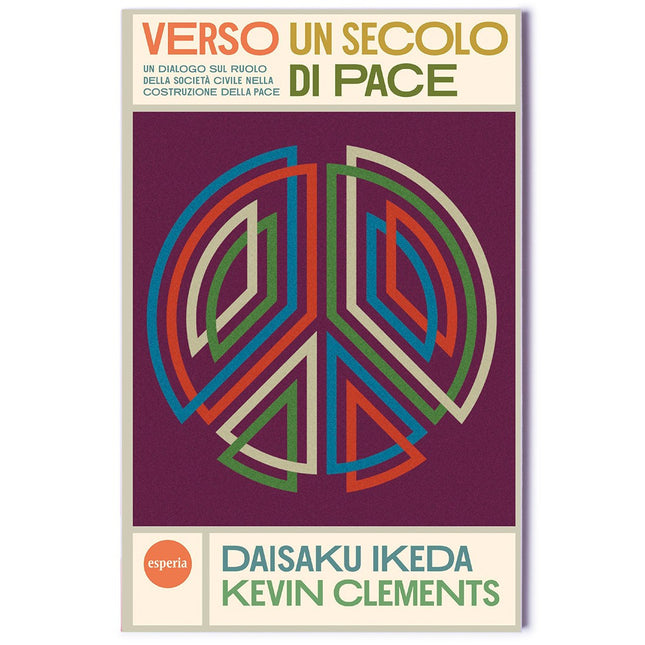
Esperia Verso un secolo di pace
Un dialogo sul ruolo della società civile nella costruzione della pace. In questo libro Kevin P. Clements, uno dei maggiori esperti mondiali di studi sulla risoluzione dei conflitti, dialoga con il filosofo e leader buddista Daisaku Ikeda sul tema della pace e sul ruolo della società civile in questo ambito. Nelle loro conversazioni, tutt’altro che accademiche o teoriche, basate sulle esperienze concrete dei due autori, che hanno dedicato la vita alla costruzione della pace, essi forniscono una grande quantità di esempi in cui è stata l’azione delle persone comuni a trasformare situazioni sociali e politiche. Emergono aspetti inconsueti del processo di costruzione della pace, che non sono alla portata solo dei diplomatici e degli statisti ma di ogni persona. Ad esempio, l’importanza di “immaginare” come sarebbe il mondo in cui vorremmo vivere, o l’importanza della “convivialità”, cioè il piacere di dialogare con le persone in circostanze informali, come davanti a un bel pranzo, che sorprendentemente si è rivelata cruciale per tanti negoziati. È un invito rivolto a tutti e in particolare ai giovani a prendere coscienza del proprio potere, perché, come afferma Daisaku Ikeda, «la mancanza di fiducia verso il governo si osserva in ogni paese, ma se i giovani perdono interesse nella politica, la società non avrà un futuro». E sempre ai giovani, ma non solo, è rivolto l’appello dei due autori a correre il rischio di uscire dalla propria zona di sicurezza per aprirsi alla diversità degli altri. La convinzione di questi due grandi pensatori è che la strada per la pace si aprirà solo quando i giovani lavoreranno insieme per uno scopo comune, uniti per risolvere i problemi al di là dei confini nazionali. «La pace non è qualcosa di astratto o separato dalla vita quotidiana. Tutti possiamo fare qualcosa per la pace proprio lì dove ci troviamo adesso.» Daisaku Ikeda «La paura e la sfiducia non aiutano il cambiamento. L’unica strada per creare un mondo giusto e pacifico è agire con la fiducia di volere un futuro migliore.»Kevin Clements «Ascoltare sinceramente i problemi di una singola persona, lì dove ci troviamo adesso, incoraggiarla e alimentare la speranza nel suo cuore è uno sforzo umile e tenace; forse non sarà una notizia che farà il giro del mondo, forse non entrerà negli annali della storia, ma ogni persona che sentirà ardere nel suo cuore una speranza nuova ritroverà la forza di vivere, e la vostra azione sarà stata preziosa per la sua vita. Questa è la base di un solido movimento per la pace ben radicato nel cuore delle persone. È mio fervido desiderio che i giovani per primi continuino a costruire una rete di persone che diffondono gioia e rivitalizzazione, creando così un magnifico raggio di luce per il ventunesimo secolo.»Daisaku Ikeda
€15,90
-
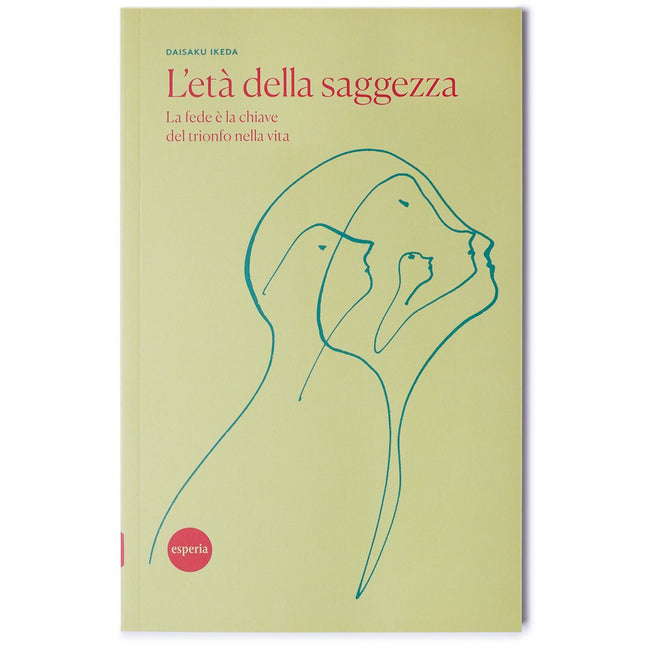
Esperia L'età della saggezza
La fede è la chiave del trionfo nella vita. Per secoli il termine anziano è stato sinonimo di persona ricca di esperienza, depositaria di un patrimonio insostituibile di conoscenza e saggezza. In tempi più recenti i mutamenti che hanno trasformato le nostre società ci hanno abituato a un'immagine diversa: debole, bisognosa di cure, scarsamente utile, la persona avanti negli anni viene percepita essenzialmente come problema sociale. Nel volume si delinea un affascinante percorso per restituire all'individuo il diritto e la capacità di vivere una vita piena e appagata fino all'ultimo, decisivo istante.
€9,50
-

Esperia Nichiren Vol.1 - Manga
Il fumetto sulla vita di Nichiren Daishonin. 272 pagine di tavole che descrivono le lotte di Nichiren Daishonin e dei suoi discepoli, a partire dal grande terremoto di Shoka (1257) fino all’esilio di Sado. La storia, scritta da Masahiko Murakami e illustrata da Ken Tanaka, finora è stata pubblicata solo negli Stati Uniti. Studiare la vita di Nichiren sarà d’ora in poi un divertimento oltre che un approfondimento della fede.
€9,90
-

Esperia La creazione di valore
La figura di Tsunesaburo Makiguchi, primo presidente e fondatore della Soka Gakkai, viene rievocata in un saggio che ne mette in evidenza le doti di insegnante, educatore e leader religioso. Le sue opere rivelano la profondità della sua preparazione culturale e una grande compassione per il prossimo, difese sino alla morte in un ambiente culturalmente retrivo e all'interno di un clima politico repressivo.
€15,90
-

Esperia Il risveglio del Budda
Clark Strand, ex monaco zen, giornalista e scrittore statunitense, ci guida alla scoperta della Soka Gakkai e del Buddismo di Nichiren da una prospettiva inedita: quella di un simpatizzante “non convertito”. Strand sottolinea che la forza della Soka Gakkai, che in pochi decenni è diventata un movimento globale, sta nel fondamentale strumento delle riunioni di discussione, basate sulla condivisione delle esperienze e sull’incoraggiamento reciproco. Nel suo viaggio all’interno di un movimento e di un insegnamento che hanno spesso generato malintesi e incomprensioni nelle altre scuole buddiste, Strand parte da Makiguchi, l’educatore che si oppose al militarismo, per poi ritrarre il suo discepolo Toda e la sua intuizione di chi o cosa fosse davvero il Budda, e arrivare alla visione globale di Ikeda e alla sua ridefinizione del ruolo di religione. Il quadro che ne esce rivela qualità e punti di forza di cui spesso nemmeno i membri dell’associazione sono consapevoli, e indica la Soka Gakkai come esempio di un movimento moderno e votato al bene del genere umano.
€9,00
-

Esperia edizioni La luce dell'apprendimento
Questa nuova raccolta di testi sull’educazione - molti dei quali già pubblicati in precedenza in un volume dal titolo Educazione Soka - è il frutto di una selezione delle opere scritte da Daisaku Ikeda, filosofo buddista e fondatore del sistema scolastico Soka, nel corso di circa cinque decenni. I testi, che spaziano da proposte educative e lezioni universitarie a saggi personali, non solo approfondiscono il significato dell’educazione soka (educazione per la creazione di valore), ma offrono una visione colma di speranza del potere dell'educazione di portare felicità alle persone e realizzare la pace nel mondo.
€16,00
-

Esperia Il maestro buddista di un pastore battista
Quando alcuni studenti della sua classe di religione presso il Morehouse College di Atlanta gli parlarono di Daisaku Ikeda e del suo impegno per la pace, Edward Carter sr – decano fondatore della Cappella Internazionale Martin Luther King – non aveva la minima idea di chi fosse. Si rammaricò che proprio lui, discepolo di Martin Luther King, pastore battista devoto alla causa della creazione della pace attraverso l’educazione e l’azione, laureato in scienze sociali e professore di religione presso il College Morehouse che del dottor King fu alma mater, non fosse a conoscenza dell’operato di questo leader buddista, presidente della Soka Gakkai Internazionale, un’organizzazione con milioni di aderenti in tutto il mondo impegnati in un movimento per la pace, la cultura e l’educazione su scala globale. Tutto ciò fu il punto di partenza che spinse Carter ad approfondire la sua conoscenza di Daisaku Ikeda, arrivando a intrattenere con il leader buddista un importante dialogo interreligioso, realizzato anche attraverso alcuni incontri diretti a Tokyo. Da quel percorso è nata l’urgenza di questo libro scritto da un pastore battista in riconoscenza del lavoro svolto per la pace da un maestro buddista. Il sottotitolo del libro ne coglie l’essenza: come il mio viaggio interreligioso con Daisaku Ikeda mi ha reso un cristiano migliore. “Esistono fondamentalmente due modi per un praticante – o almeno così è nel Cristianesimo – di relazionarsi con i praticanti di altre religioni che sono dediti alla loro fede tanto quanto i cristiani alla propria. Uno è quello di convertirli; l’altro, invece, è di imparare rispettosamente da loro, senza ricercare l’uniformità ma l’armonia.” “A mio parere Daisaku Ikeda rappresenta un esempio di cosa signifi chi essere un ‘cittadino globale’. Ha dialogato con ambasciatori, antropologi, economisti, educatori, storici, giornalisti, giuristi, linguisti, politici, scienziati, ingegneri sociali, sociologi, teologi e urbanisti, e anche con me, cambiando completamente la mia vita.” L'autoreLawrence Edward Carter Sr è un pastore battista, decano della cappella Martin Luther King del Morehouse College di Atlanta, istituzione presso la quale è anche professore di religione. Nato a Dawson, in Georgia, e cresciuto a Columbus, nell’Ohio, si è laureato presso l’Università di Lynchburg della Virginia in scienze sociali e psicologia, per poi continuare la sua carriera accademica all’Università di Boston, dove ha conseguito i titoli di Master of Divinity in teologia e Master of Sacred Theology in assistenza religiosa, nonché un dottorato in psicologia pastorale e consulenza. Ha un figlio, Carter, e vive a Stonecrest, in Georgia, insieme a sua moglie Marva.
€16,50
-

Esperia Librarsi nei cieli della speranza
Stringere amicizie, cantare canzoni, leggere buoni libri, dire "grazie", nutrire grandi sogni, sorridere. In questa raccolta di saggi dedicati ai bambini e alle bambine, il presidente della SGI Daisaku Ikeda descrive questi e altri punti chiave per vivere una vita felice. Le ragazze e i ragazzi, "i tesori del futuro", potranno godere di questi semplici messaggi scritti appassionatamente per loro.
€12,00
-
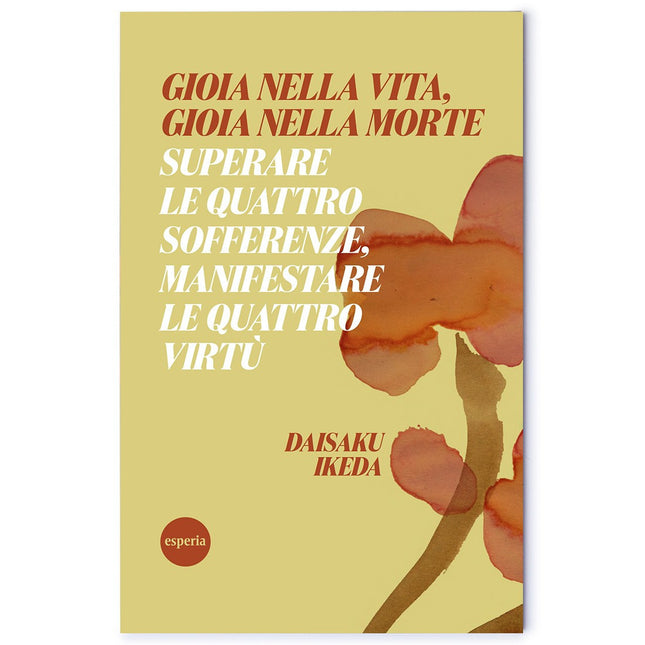
Esperia Gioia nella vita, gioia nella morte
Affrontare le quattro sofferenze, manifestare le quattro virtù. La civiltà moderna ha dimenticato il senso della morte. Eppure, secondo Nichiren Daishonin, se non affrontiamo per primo il problema della morte, non saremo in grado di vivere una vita piena e realizzata. Secondo la visione buddista della vita, infatti, gli esseri umani possono assaporare la gioia sia nella vita sia nella morte, se attingono a quello speciale stato vitale chiamato “Buddità”: impalpabile, invisibile, eppure onnipresente in ogni forma di esistenza nell’universo. Anzi, secondo quanto aveva intuito Josei Toda mentre si trovava in prigione durante la Seconda guerra mondiale, è proprio la Buddità a costituire il nucleo fondamentale della vita, di ogni forma di vita. Josei Toda insegnò a Daisaku Ikeda che il Buddismo è l’insegnamento capace di superare le sofferenze di nascita, invecchiamento, malattia e morte e a sua volta, Daisaku Ikeda torna ad affrontare le questioni fondamentali dell’esistenza a beneficio dei lettori. Lo fa dialogando su questi temi con alcuni membri delle divisioni medici e infermieri della Soka Gakkai, tutte persone che nella loro attività professionale hanno sperimentato la profonda relazione che intercorre tra Buddismo e medicina e che si sforzano in modo invisibile di sostenere la vita delle persone. Nel loro dialogo ad ampio spettro, Daisaku Ikeda stimola i rappresentanti della professione medica a rivelare esperienze personali particolarmente toccanti con i pazienti e a spiegare come affrontare i problemi comuni all’esistenza di ogni essere umano: essere colpiti dall’influenza, gestire un familiare affetto da Alzheimer o semplicemente ospedalizzato, il rischio delle pandemie influenzali, di particolare attualità. Consigli validi sia dal punto di vista pratico e igienico, sia da quello dell’atteggiamento e della fede.La questione fondamentale del XXI secolo, dice Ikeda nella prefazione al volume, è proprio «quella delle quattro sofferenze fondamentali. La nostra è una sfida senza fine e proprio per questa ragione continuerò ad affrontare i grandi temi dell’esistenza, cercando di rispondere agli interrogativi del mondo contemporaneo». Nessuno può evitare le quattro sofferenze che sono all’origine dell’insegnamento buddista: esso infatti indica la via grazie a cui ogni persona può risolvere il problema della sofferenza nella propria vita. "Secondo la filosofia buddista la nascita e la morte sono parte di un ciclo ininterrotto che viene guidato da un insieme di cause interne e di relazioni con l’ambiente. La morte può quindi essere considerata come un’occasione per recuperare energia in vista di una successiva rinascita, allo stesso modo in cui con il sonno riacquistiamo l’energia che occorre per l’indomani. Perseverando nella pratica buddista è possibile provare la gioia nella vita e nella morte. Ritengo che la questione fondamentale del xxi secolo sia proprio quella delle quattro sofferenze fondamentali, che anche Arnold Toynbee e Linus Pauling ritenevano essenziale affrontare. La nostra è una sfida senza fine e proprio per questa ragione continuerò ad affrontare i grandi temi dell’esistenza, cercando di rispondere agli interrogativi del mondo contemporaneo."Daisaku Ikeda
€14,90
Hai visto 36 prodotti su 56













